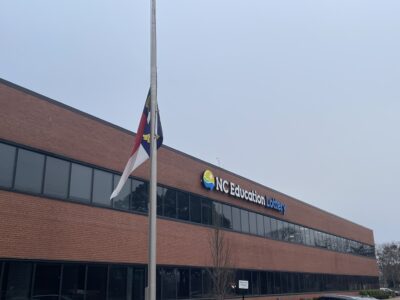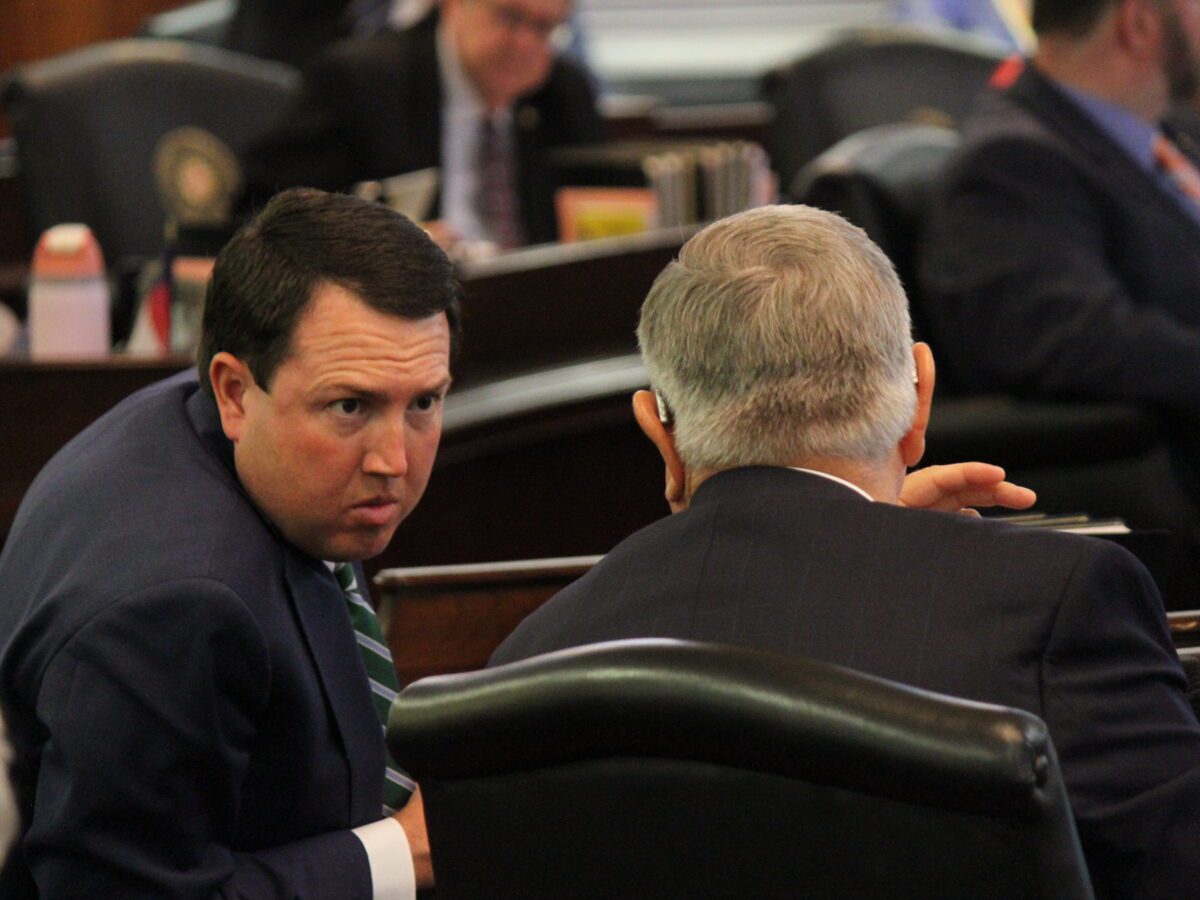
After weeks of negotiations and nearly one month into the new fiscal year, the North Carolina General Assembly voted this week to adopt a continuing budget resolution — a “mini-budget” — that funds essential parts of the state government.
The mini-budget funds step adjustments for employees on salary schedules, including teachers, principals, and other school staff, but does not raise salaries themselves. EdNC previously reported on the different proposals for teacher raises from the House, Senate, and governor, but none of those proposals made it into the mini-budget.
House Bill 125, the bill rewritten to become the mini-budget, also funds enrollment growth adjustments for public schools, community colleges, and the University of North Carolina System.
The Senate passed the mini-budget on Tuesday and the House passed it on Wednesday, with bipartisan support in both chambers. The bill text indicates most parts of the bill will go into effect retroactively to July 1, 2025 once it becomes law.
A committee of Senate and House Republicans crafted the mini-budget, which is “not perfect,” according to Sen. Brent Jackson, R-Sampson, who was on the committee.
“It’s not everything we wanted. It’s not everything they wanted. It is a compromise,” Jackson said. “But these things that we have narrowed it down to address the pressures that we know, at this moment, that without these adjustments there would be major problems come here shortly in a few weeks, for our agencies and for a lot of North Carolina citizens.”
Rep. Marcia Morey, D-Durham, said the process did not include Democrats. “We have not had a voice at the table on this,” she said.
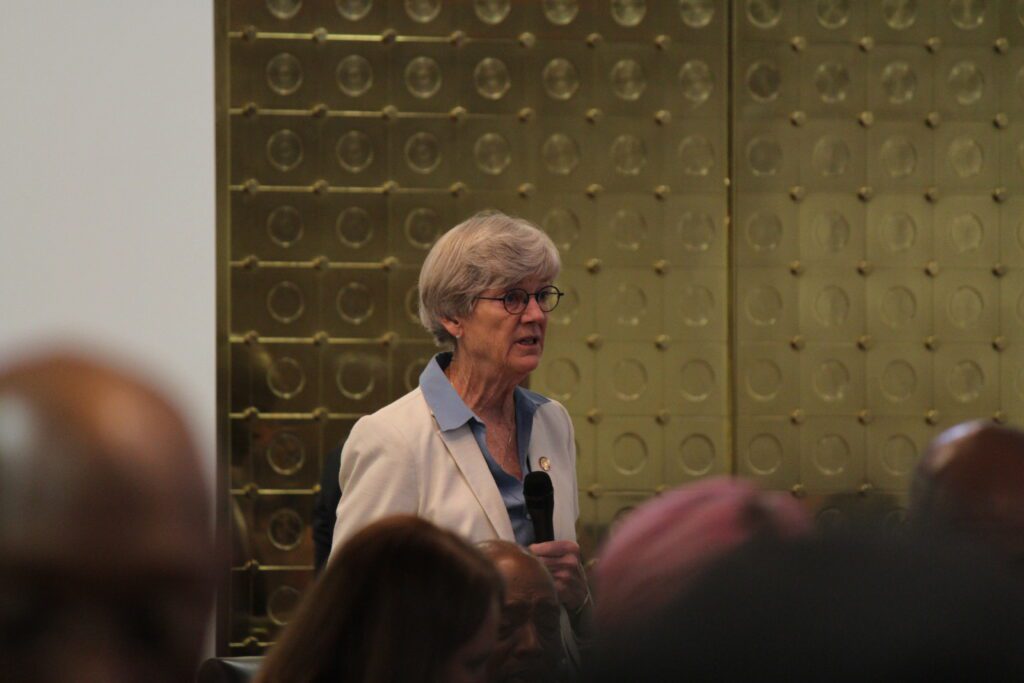
The mini-budget came hours after Gov. Josh Stein called on the legislature to pass a budget, amid a weekslong standstill.
“The people of North Carolina need and deserve a state budget,” Stein said. “I urge the General Assembly to come together and pass a budget that invests in our people and their futures.”
A previous version of the bill passed the Senate but was voted down in the House in late June, when legislators adjourned without passing a budget by the July 1 deadline. Since then, the state government has been funded at the 2024-25 level.
“This plan is a step along the path that ultimately leads us to a final budget,” said Rep. Donny Lambeth, R-Forsyth, who introduced the mini-budget in the House. “It takes time to negotiate a good budget.”
Legislators also passed an adjournment resolution on Tuesday that lays out their meeting schedule for the rest of the session. After this week, the resolution says the General Assembly will reconvene once per month, starting on Aug. 26. You can see the other meeting dates here.
Read in detail about the contents of the mini-budget relating to public schools and community colleges below.
![]() Sign up for the EdWeekly, a Friday roundup of the most important education news of the week.
Sign up for the EdWeekly, a Friday roundup of the most important education news of the week.
Educator pay
The mini-budget does not provide new raises for educators, but does fund salary schedule step increases for state employees — increases of an employee’s level on the salary schedule, based on years of experience. That means teachers (and other state employees on a salary schedule) will be paid at the level of the 2024-25 budget, but adjusted for their current experience level.
The bill text states: “Public school employees paid on the teacher salary schedule, the principal salary schedule, or any other salary schedule established by State law are authorized to move up or down on applicable salary schedules and receive applicable automatic step increases.”
Here is a look at the current salary schedule for teachers:

The same bonuses for which teachers and principals are eligible under current programs (teacher bonuses under S.L. 2023-134 Section 7A.3; principal bonuses under S.L. 2024-39 Section 1.3) are also funded by the mini-budget.
The total appropriations for employee benefits in Fiscal Year 2025-26 are as follows:
- $14,764,787 to the N.C. Community College System (NCCCS)
- $115,396,268 to the Department of Public Instruction (DPI)
Funds previously allocated to the NCCCS for nursing faculty raises are reduced by $1.1 million per year of the biennium in the mini-budget to “align the appropriated amount with the actual amount expended.”
Cuts to the DPI budget
Throughout the mini-budget, allocations to various state agencies are reduced by the amount of new receipts transferred to cover the agency’s operations.
Receipts for DPI’s Public School Fund are increased by about $46 million, coming from sales and use tax proceeds from the Department of Revenue, and the State Textbook Fund. The net General Fund appropriation to DPI “is reduced by an amount equal to these increases in receipts,” the mini-budget says.
However, the bill says that appropriations to DPI are reduced by more than $9.1 million in both years of the biennium. Because the General Assembly did not publish a money report along with the mini-budget, it is unclear if DPI’s total state funding has decreased during the biennium as a result of this reduction.
The $9.1 million in each year of the biennium eliminated from DPI’s budget comes from:
- $3 million per year in cut funding “to offset copays for reduced-price school meals to match actual expenditures.”
- $1.8 million per year in cut funding for “small specialty high schools, an initiative that previously supported a school-within-a-school model.”
- $1 million per year in cut funding for virtual cooperative innovative high schools, which existed under a previous version of the state’s dual enrollment program, but are now part of the Career and College Promise program.
- $1.8 million eliminated per year for a contract with Plasma Games, Inc. for science, technology, engineering, and math (STEM) educational software.
- $1.5 million per year in cut funding for Beginnings for Parents of Children Who are Deaf or Hard of Hearing, Inc., “a nonprofit that provides outreach and support for parents and families of children who are deaf or hard of hearing.”
The mini-budget also directs DPI to eliminate positions that remained vacant at the end of the 2024-25 fiscal year, in order to achieve a nearly $1.9 million reduction in its budget for both years of the biennium.
State Employee Health Plan
The mini-budget increases state funds to the State Health Plan, which provides health care coverage to nearly 750,000 teachers, charter school employees, community college employees, other employees, retirees, and dependents.
The mini-budget increases the annual employer contribution for each covered employee to a maximum of $8,500 for the 2025-26 fiscal year.
Republican State Treasurer Brad Briner, who oversees the plan, thanked the General Assembly for the increased funding following the announcement of the mini-budget.
“We are grateful to the General Assembly for their agreement to provide a historic investment into the State Health Plan and for fully funding the pension plan,” Briner said. “We have been working hard to overcome the $500 million deficit in the Plan, and these funds are critical to making the Plan solvent for our hard-working state employees.”
Read more
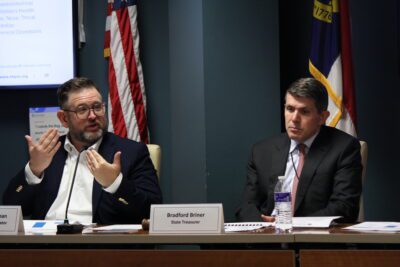

Enrollment adjustments
The mini-budget appropriates roughly $104.2 million in each year of the 2025-27 fiscal biennium to public schools for “changes in average salaries, special population headcounts, supplemental funding in low-wealth counties, and other technical adjustments.”
For community colleges, there is a total of nearly $95 million each year to account for enrollment increases across the state. Of that, nearly $20 million is funded through receipts.
Education Lottery allocations and more
Historically, the General Assembly has directed funds from the state lottery to different programs; in the mini-budget, lottery allocations for each year of the biennium are over $1 billion for the first time.
You can see education allocations of lottery funds over time in Table 2 of this article. Below, you can see the education lottery allocations funded in the mini-budget.

The largest allocation is to non-instructional support positions, like substitute teachers, which have been funded by the lottery since 2016-17. Other large programs include capital funds for school construction, a prekindergarten program, and school transportation.
The allocation of more than $180 million for each year for school transportation is a nearly nine-fold increase in funding since last year, when the amount was approximately $21.4 million. That increase covers a roughly $160 million cut in both years of the biennium to school transportation from DPI’s State Public School Fund.
Newly receiving lottery money in this biennium is the Children of Wartime Veterans Scholarship, which awards money for the children of veterans to attend North Carolina universities and community colleges.
Under the mini-budget, the Indian Gaming Education Revenue Fund provides a total of $39 million over the biennium toward textbooks and classroom materials. Of that, $17 million covers other cuts to textbooks and classroom materials.
Finally, $20 million extra, on top of about $215 million from the Civil Penalty and Forfeiture Fund, is directed to the State Public School Fund by the mini-budget. The $20 million extra replaces $20 million in state funds cut from the Public School Fund.
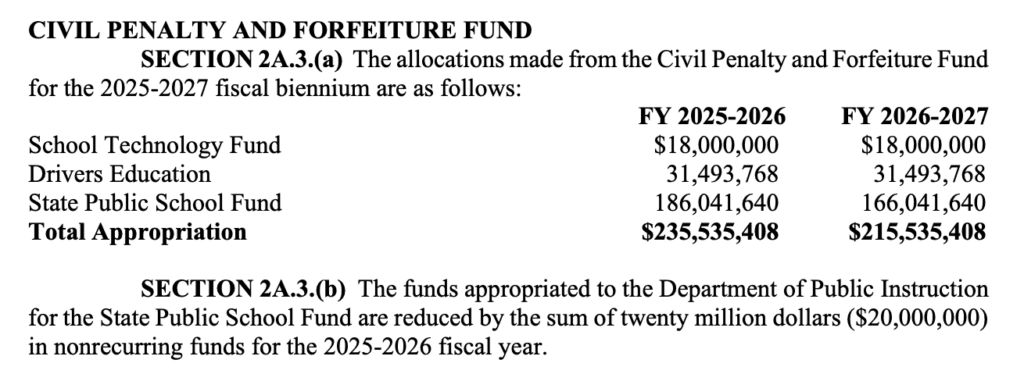
Reduced-price school meals
Local boards of education are instructed by the mini-budget to provide school meals at no cost to students who qualify for reduced-price meals under the federal National School Lunch Program or School Breakfast Program.
The bill says DPI can use funds appropriated to the State Aid for Public Schools Fund “if funds from alternate sources are insufficient.”
A newly established ‘Division of Accountability, Value, and Efficiency‘
The mini-budget also establishes a new division within the Department of the State Auditor called the Division of Accountability, Value, and Efficiency — or DAVE — charged with assessing “the continued need for each State agency and the vacant positions within each agency.”
The bill text states the division “may also employ individuals to utilize artificial intelligence and other appropriate tools for the purpose of examining any of the following with respect to State agencies and their budgets:
- “Amounts spent, including the entities receiving funds and the intended purpose of the amounts spent.
- “The effectiveness of any amount spent in achieving the intended purpose of that spending.
- “Duplicative spending.
- “Any other factor demonstrating the fiscal soundness or effectiveness of the State agency or lack thereof.”
The mini-budget appropriates $6 million in each year of the biennium for up to 45 positions within DAVE.
Other appropriations
The mini-budget appropriates $9.4 million to DPI in each year of the biennium toward funding for the Uniform Education Reporting System, for “costs associated with transitioning to a new student information system.” According to the bill, the system “supports multiple software platforms, for costs associated with transitioning to a new student information system.”
It also directs $10 million in nonrecurring funds to Wilson Community College to support the operation of its biologics training center.
And it changes language around $25 million previously allocated to Yancey County Schools for Hurricane Helene repair, now stating the funds are simply for “constructing new or upgrading existing school facilities.”
Finally, the mini-budget transfers $8 million each year of the biennium from a federal Temporary Assistance for Needy Families (TANF) block grant to the Child Care Subsidy program. The net allocation for the Child Care Subsidy program is unchanged.
You can read the full mini-budget on the General Assembly’s website.
Recommended reading

